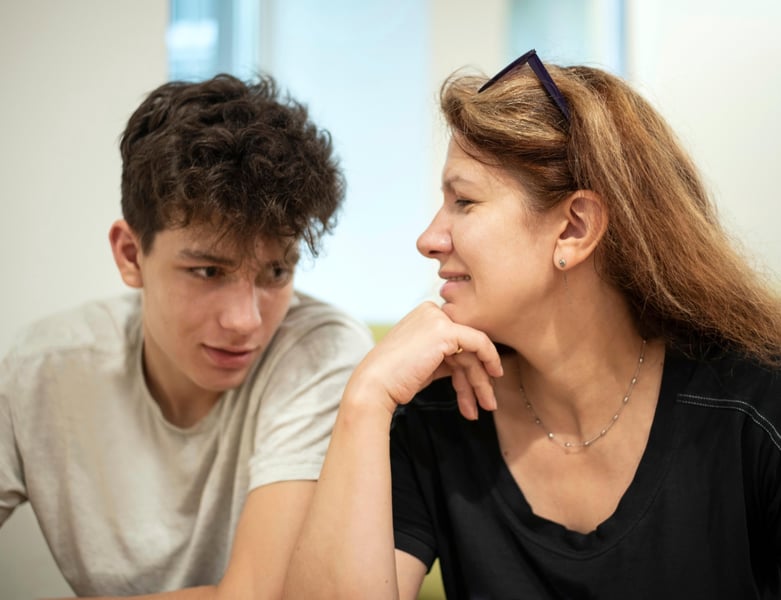Get Healthy!

- Denise Mann
- Posted March 23, 2023
Close Bond With Your Teen Can Keep Them Physically Healthy, Too: Study
Ask your teen about their day and try to spend more quality time together.
It matters, a new study found.
Teens who report better relationships with their moms and dads are healthier both mentally and physically and less likely to abuse drugs or alcohol as young adults, according to researchers.
"Teens who reported higher levels of warmth, communication, time together and satisfaction with relationships and communication with parents -- when re-interviewed 14 years later in young adulthood -- reported higher levels of general health, optimism and quality of romantic relationships,"said study author Dr. Carol Ford, chief of adolescent medicine at Children's Hospital of Philadelphia.
These teens also reported lower levels of stress and depression, as well as lower use of nicotine, alcohol, cannabis and other drugs, she said.
Exactly why or how close relationships with parents protects teens is not fully understood.
"We suspect that strong positive connections between adolescents and mother and father figures are broadly protective and promote resilience even into adulthood," Ford said.
For the study, her term reviewed data from a nationwide health study of 15,000 adults who enrolled in the mid-1990s when they were 12 to 17 years of age. They were asked 14 years later about their current levels of stress, depression, optimism, nicotine and substance use, as well as other general health measures.
Overall, folks who reported receiving more warmth, communication, time together, academic expectations or communication with their moms or dads reported higher levels of general health as young adults.
Similarly, they reported significantly higher levels of optimism and romantic relationship quality and lower levels of stress and depressive symptoms.
The findings apply to relationships with other adults who serve as mother and father figures.
"It is helpful if adolescents feel that most of the time their mother and father figures are warm and loving towards them, that they feel close to them, and that they feel the adults in their lives care about them,"Ford said.
Adults should talk to teens about school, activities, problems they are having and romantic relationships, she said.
"Remember, sometimes 'talking' involves a lot of listening,"Ford added.
Spending time together counts, too, she said.
Letting your child know what is expected of them is also helpful, and this includes setting expectations about graduating from high school and/or college.
"If adolescents have done something wrong, that is important; it is helpful if the adults raising them talk with them and help them to understand why it was wrong,"she said.
The study was published March 21 in JAMA Network Open.
Outside experts point out that good adolescent-parent relationships will pay dividends across a teen's life span.
Parents should pay close attention to these study findings, said Kimberly Wolf, an adolescent health specialist in Houston and the author of "Talk With Her: A Dad's Essential Guide to Raising Healthy, Confident, and Capable Daughters."
"Having parents around and present, even if there aren't big conversations being had, can be comforting,"Wolf said. "When adolescents have open communication with their parents, adults are better able to recognize and address a mental health concern."
Her advice? Be direct if you are concerned about something. "Bring it up even if it feels awkward or scary,"she urged.
The study's findings reflect "the vital role of a positive adolescent-parent relationship during adolescence [and] how this affects people in their life span,"Dr. Shawna Newman agreed. She is the director of child and adolescent psychiatry at Lenox Hill Hospital in New York City.
Teens' own perceptions of their relationships with their parents were associated with their general health, mental health, sexual health and substance use in young adulthood, she said.
"This study is a remarkable reflection of a modifiable approach to interactions between adolescents and their parents that may have profound positive benefits in the long term,"Newman said.
Social environment and individual experiences also play a role in a young person's health and development, according to Dr. Gabrina Dixon, a pediatric hospitalist at Children's National Hospital in Washington, D.C.
The study was done in 1994-1995 and 2008-2009, Dixon noted. More recent data may offer additional insights.
"There have been so many changes in society, including multiple social media platforms and the COVID-19 pandemic, that the study doesn't take into account,"Dixon said.
More information
The Nemours Foundation offers tips for parents on talking to teens.
SOURCES: Carol Ford, MD, chief, Craig Dalsimer Division of Adolescent Medicine, Children's Hospital of Philadelphia; Kimberly Wolf, MEd, adolescent health specialist, Houston; Shawna Newman, MD, director, child and adolescent psychiatry, Lenox Hill Hospital, New York City; Gabrina Dixon, MD, MEd, director, Advancing Diversity in Academic Pediatrics, and pediatric hospitalist, Children's National Hospital, Washington, D.C.; JAMA Network Open, March 21, 2023






